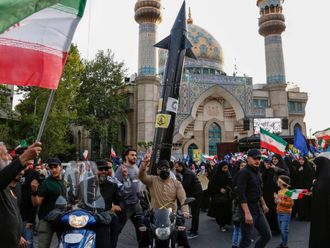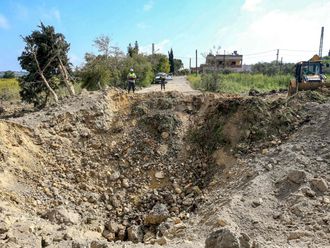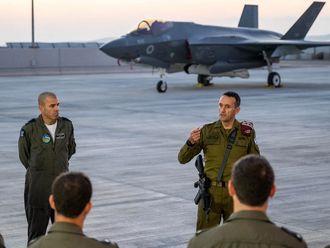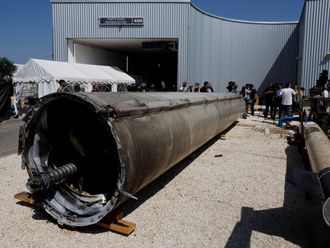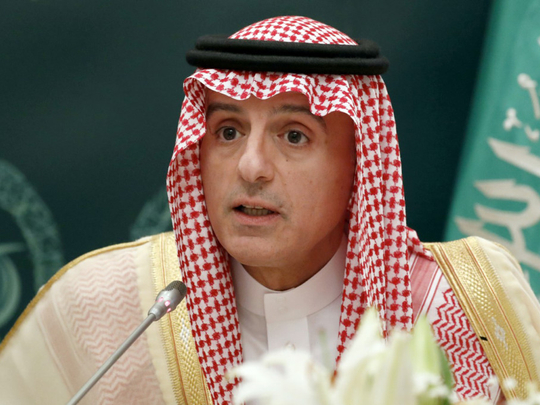
Dubai: Saudi Foreign Minister Adel Al Jubeir has told CNBC that Saudi Arabia would not allow Lebanon to “be the platform from which harm comes to Saudi Arabia”.
He accused the Iran-backed Hezbollah group of hijacking the Lebanese system and placing obstacles in front of Prime Minister Sa’ad Hariri’s government.
“Lebanese people are innocent and have been dominated by Hezbollah and we need to find a way to help the Lebanese come out from under the thumb of Hezbollah.”
“Hezbollah continues to hold on to its militia although it should hand over its weapons,” he said, adding “there should be no weapons outside the scope of government institutions.”
Accusing Hezbollah of thwarting each initiative made by the PM, he said: “Hezbollah has been an instrument used by Iran to dominate Lebanon, to interfere in Syria, with Hamas and Al Houthis in Yemen.”
“It has been responsible for smuggling weapons into Bahrain and is involved in drug dealing, criminal activity and money laundering. The world has to take action in terms of curtailing their activities,” he stressed.
To a question on whether Riyadh was considering cutting diplomatic ties with Lebanon, Al Jubeir said: “We are looking at various options and consulting with friends and allies around the world to see the most effective way of dealing with the menace called Hezbollah.”
On Iran, Al Jubeir said that Saudi Arabia would like to see sanctions on Iran for its support of terrorism and for violating the ballistic missile resolutions of the United Nations.
“Fixing the nuclear agreement and holding Iran accountable for its support of terrorism and for its ballistic missile program, when you combine the three, I think we have an effective way of dealing with Iran,” he said.
On being asked about the ballistic missile launch from Yemen, he said that the missile was Iranian built and was similar to a missile that was launched against the city of Yanbu on July 22.
“It’s a carrying missile, has a range of over 900 kilometre. It was smuggled into Yemen in parts and then assembled in Yemen we believe by the Revolutionary Guards and Hezbollah experts and then it was launched at our city,” said Al Jubeir.
On the nuclear deal with Iran, he said that it is about fixing a deal that needed to be fixing.
“The nuclear agreement was weak. It has a sunset provision which expires 12 years after the signing of the agreement which lifts the restrictions on how many centrifuges Iran can have. The Iranians theoretically could have 50,000 to 100,000 centrifuges,” he said.
On Thursday, Saudi Arabia, Kuwait and the UAE called on their citizens and residents currently in Lebanon to leave as soon as possible, following a move by Bahrain earlier in the week.
Citizens were also advised not to travel to Lebanon from any other international destinations.
The travel warnings come a week after Sa’ad Hariri resigned as Lebanon’s prime minister citing fears for his life and a tense political environment reminiscent of the times before his father, Rafik Hariri, was assassinated in 2005, allegedly by the Syrian regime and Hezbollah. Critics of Hezbollah say that the group —which commands a huge military presence—flexes its muscle to influence Lebanon’s policies.
On Monday Saudi Gulf affairs minister Thamer Al Sabhan said the Lebanese government would “be dealt with as a government declaring war on Saudi Arabia” because of what he described as aggression by Hezbollah.
Al Sabhan said “there are those who will stop (Hezbollah) and make it return to the caves of South Lebanon”.
Observers have speculated about the growing possibility of a fresh war in Lebanon which could possibly see Israeli military action against the Iran-backed Hezbollah group there.
Lebanon has been mired in political turmoil as the fragile democracy struggled to balance the interests of rival parties backed by Tehran and Riyadh.
Lebanon was without a president for over two years until a deal was reached to elect Michel Aoun in 2016. The deal, which also saw the return of Sa’ad Hariri to government, raised hopes that he would be able to counter Hezbollah’s growing influence in the country.
However, the group —which commands a huge military presence—has continued to flex its muscle to influence Lebanon’s policies.
Saudi foreign minister Adel Al Jubeir recently echoed these concerns and said Hezbollah’s domination made fair governance impossible.


